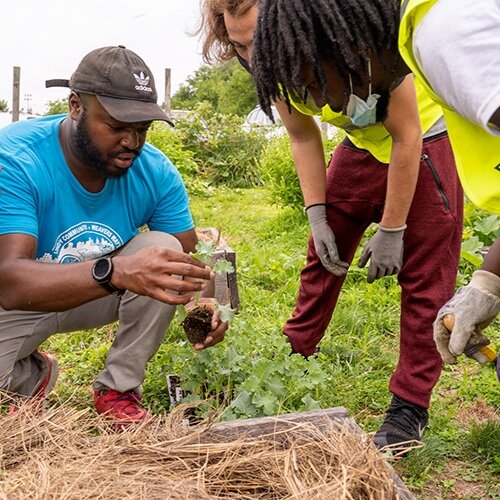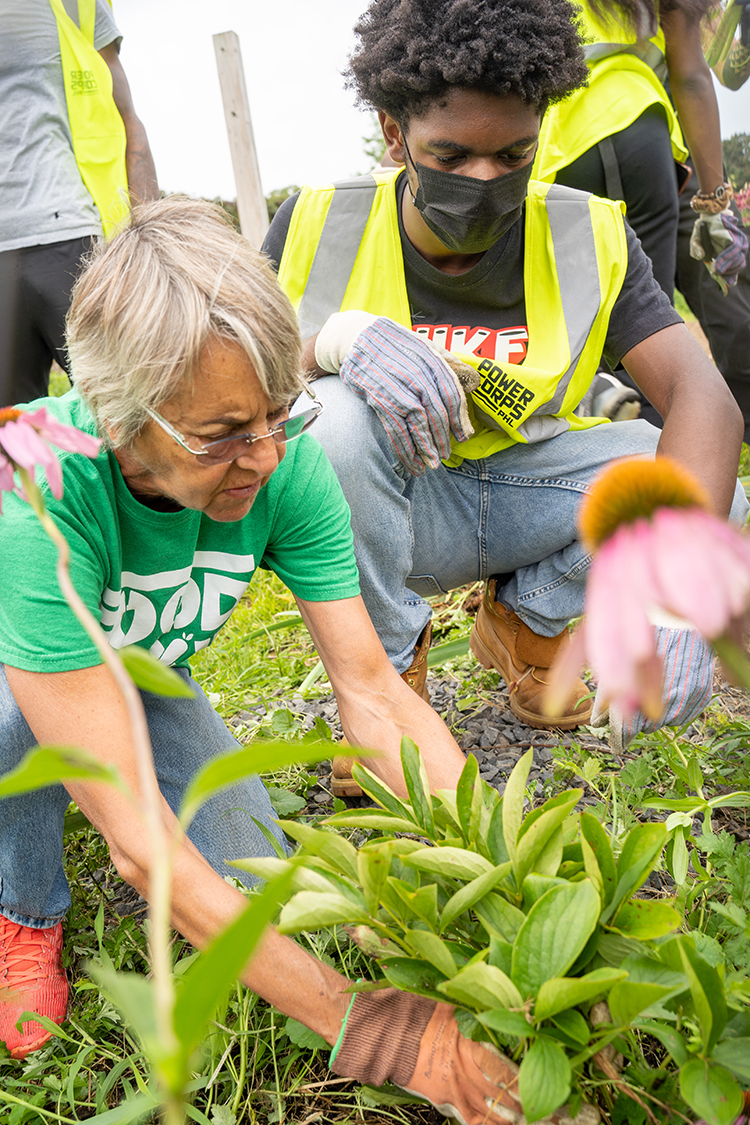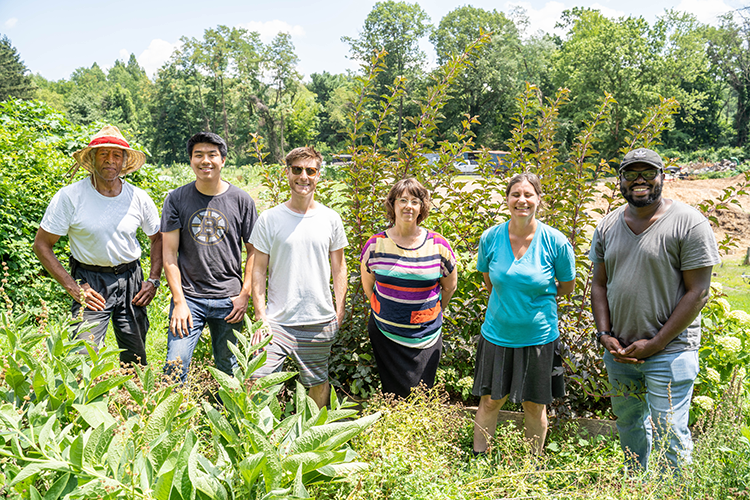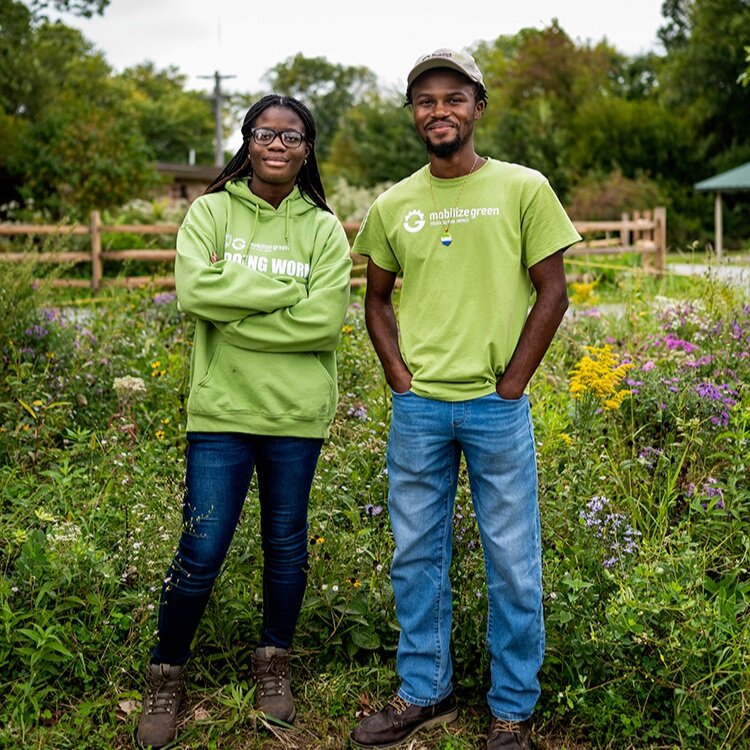From seed to supper” sums up the credo of Food Moxie, a Northwest Philadelphia nonprofit that “educates and inspires people to grow, prepare and eat healthy food,” says Lisa Mosca, executive director of this offshoot of Weavers Way Co-op.
Launched in 2006, Food Moxie grew from a project where Weavers Way in Mount Airy supplied students at the historic Charles W. Henry School, just across the street, with wholesome snacks. This initiative flourished and morphed into Food Moxie, a separate organization still related to Weavers Way.
“Food Moxie grows two-and-a-half tons of vegetables a year and has about 400 participants annually across all programs,” Mosca says. “About 5,000 volunteer hours a year go into supporting planting, weeding, watering, mulching and harvesting crops.”
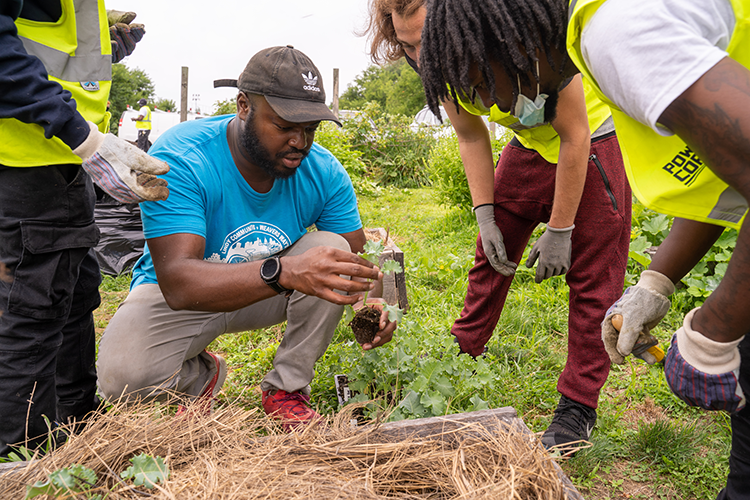
Volunteers also pack seeds for distribution, create organic pest control kits, help with home deliveries to students, and more. The organization also depends on volunteers for its board of directors and other tasks, Mosca says.
Food Moxie raises vegetables at three sites: W. B. Saul High School—the nation’s largest agricultural farm school—in Roxborough; Martin Luther King High School in East Germantown; and Stenton Family Manor, a faith-based Mount Airy shelter for families experiencing homelessness.
“Altogether, we grow vegetables on about 1.5 acres of raised-bed space,” says Mosca, who gained a love of gardening from her mother, who grew up on a farm.
Education is the heart of Food Moxie.
“When people learn to grow and cook healthy foods, it strengthens the whole community,” says program manager Dorene Reggiani, an herbalist whose love of cooking and gardening stretches back to her great-grandparents, who farmed olives in Sicily.
Before participants even touch the earth, Brandon Ritter, manager of growing spaces, sets the stage for learning.
“You let people know that they’re respected, that every voice matters,” says Ritter, who began farming at age six with his grandmother. “For instance, when we cook harvested vegetables in Hope Kitchen at Stenton Manor, participants have different ideas about what spices to use, depending on their cultural heritage.”
The Henry Got Crops Farm involves a collaboration of Food Moxie, Weavers Way Co-op, Saul High School and Fairmount Park. “Saul students do everything from hands-on fieldwork to applied research and summer internships,” says Reggiani.
Food Moxie tailors its program to address the needs of participants. At MLK High School, Food Moxie’s Farm Club programming includes students affected by autism and intellectual disabilities. Students look forward to the sensory stimulation: the scent and feel of earth and plants and the taste of vegetables.
“They learn life skills related to urban farming and nutrition,” Ritter says. “Activities like planting seeds can help develop fine motor skills.” Programs always include tasting or cooking from scratch as well as gardening.
At Stenton, Food Moxie staffers guide families in both gardening and cooking. Children from ages 5 to 11 can attend the Garden Club, an after-school program and summer camp in the backyard that began in 2009. The garden’s fresh produce provides healthful seasonal snacks and boosts the nutritional value of meals for residents. “It offers a safe space for young residents to explore and taste seasonal produce,” Mosca says of the city’s first such program for families experiencing homelessness.
Participants see how much you can grow in a small space, Ritter notes. “The program also includes vegetables with which they may not be familiar.”
The garden works in tandem with Hope Kitchen, which offers adult caregivers a chance to cook and garden. The focus is on good nutrition and eating fresh, seasonal foods.
“Participants gain basic cooking skills and learn how to eat well on a budget,” says Reggiani.
COVID-19 posed challenges that they addressed in several ways.
“Food Moxie met the need for nutrient-dense produce by distributing free produce biweekly during the MLK grab-and-go lunch pickups,” Mosca says. “In 2020, with support from generous donors, Food Moxie gave out 150,000 pounds of regionally grown fresh produce and eggs to support good nutrition when many community members were facing hardships around access.”
To avoid “the COVID slide” where students lost academic ground, Food Moxie’s YouTube channel featured videos for remote learning support. Reggiani also designed kits for activities students could do at home, such as growing microgreens and making lip balm.
“PowerCorps, Penn Charter [School] and Villanova students packed kit ingredients and dry goods while some Weavers Way [members] did their required hours by making home deliveries to almost 200 students and their families,” says Mosca.
Food Moxie encourages program graduates to continue growing and cooking their own food. Graduates from Stenton moving into their own homes receive a Fresh Start Kit.
“If we know someone is moving to Southwest Philadelphia, for example, we tell them about Sankofa Community Farm at Bartram’s Garden,” Mosca says.
Food Moxie also lends a hand elsewhere, like East Mount Airy’s 48-bed community garden.
The city’s reopening has Food Moxie staff raring to go.
“We’re eager to support people who want to grow and cook their own food,” Mosca says.
For more information, visit foodmoxie.org

